My Peru Travel Guide Part I – Lima, the Amazon jungle & West Coast
South America has been on my bucket list for such a long time! Especially Peru with the dreamy landscapes and fascinating history has been a dream of mine.
Here is Part 1 of my Peru Travel Guide !
Read here about Part 2 of my Peru Guide: From the Titicaca lake through the Andes to Cusco and Machu Picchu!

IS A ROAD TRIP IN PERU SAFE?
In May we decided to travel to Peru for a road trip to see as much from the country as possible in the 3 weeks. May is a great month to travel to Peru cause it’s the beginning of the dry season (November till April is rainy season) and there are still less tourists.
We got many questions about the safety to drive your own rental car in Peru but it was way better than we expected it to be. Of course there are several sharp curves while driving through the Andes but the streets are mostly in good conditions. We saw the night busses for tourists and some of them drove like crazy through the Andes so I felt much safer in our own car. Only in the bigger cities it gets a bit difficult, since the people drive like there are no rules! The only way of not getting stuck in the traffic is to adapt the driving style a litte and to honk if you want to drive. I was very lucky my husband was driving in this city chaos.

THE CAPITAL – LIMA
From Germany we took a flight to Miami for a connecting flight to Lima. We didn’t had any high expectations for the capital of Peru cause even our travel guide said that it’s not the prettiest city. But anyway we planned a full day to explore the city and to create our own impressions.
We stayed at the Double Tree Hilton from where we started our tour by walking. We passed a really beautiful olive garden with plenty of birds till we arrived at our first stop: Huaca Pucllana. It’s a pyramid from 650 AD built by a culture which lived many hundred years before the Incas, called the Lima Empire. Nowadays the pyramid is surrounded by many modern buildings in the middle of the city which makes a great contrast.
There are several tours in English or Spanish which are included in the Ticket ( 15 Soles / 4,50 Euro ). The whole complex is only made out of clay bricks but still in a really good condition due to the fact that it almost never rains at Perus West Coast. Only 20 mm of rain is falling from the sky each year! Therefore the sun is really intense – Peru is the country with the highest UV Index. So you should definitely bring sun glasses, sun blocker and even a sun hat when exploring the pyramid – otherwise you will get a sunburn real quick!

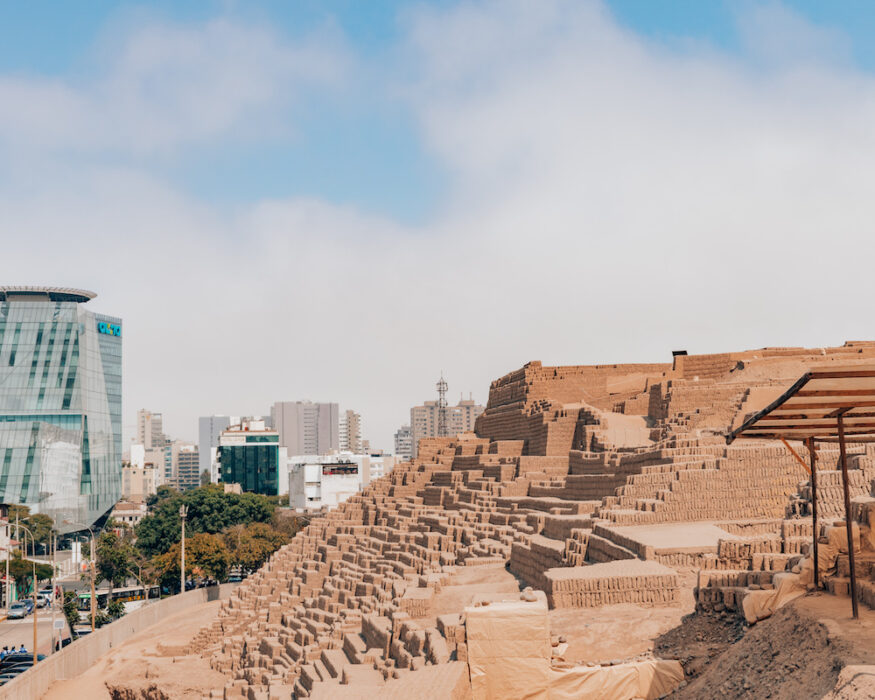
We continued our walk to a very pretty part of Lima called Miraflores which is located right at the coast line with many shops, restaurants etc. It has some of the best views to overlook the ocean with the city next to it. Especially the Park of Love and the spots nearby are worth a visit.
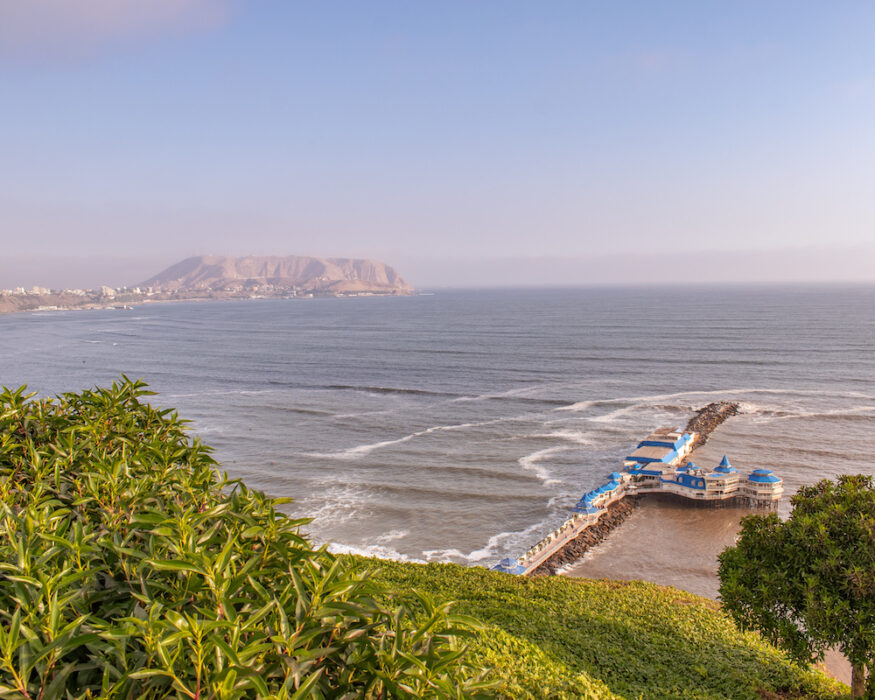

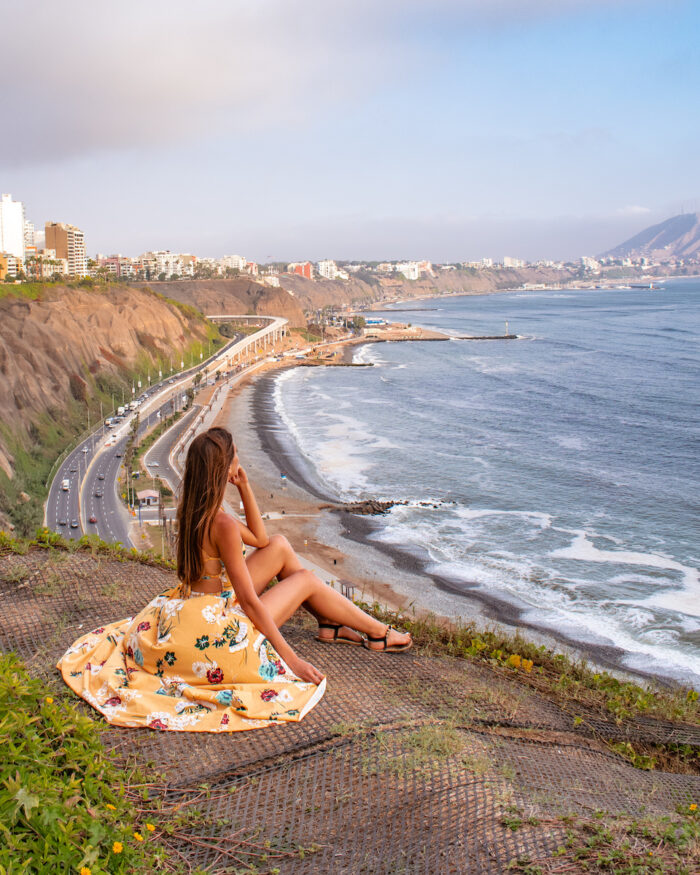
Just in time for sunset we took a taxi to Cerro San Cristobal – a hill over the city with an amazing overlook. With all the lights the view over Lima almost reminded me a bit of Los Angeles. The last shine of the sunset gave the whole city a magical purple glow.
After this full day of exploring Lima we have been positively surprised! Contrary to what we read in the travel guide, the city is definitely worth a visit and has some beautiful places!

THE JUNGLE CITY – IQUITOS
From Lima International Airport we took a flight to the city Iquitos. You can only reach it via plane or boat over the Amazon river since it’s located in the middle of the jungle.
During our 1,5 hrs flight it was impressive to see how the scenery was changing: From the barren desert landscape around Lima to the high Andes and finally we saw the jungle through the window with the 7800 km long Amazon river running through it.

Iquitos is a small city which got wealthy cause of natural rubber export after the Spanish conquest. Nowadays the city mainly lives from tourism and it’s the best spot in Peru for a jungle tour.
During our first day we were exploring the city and met a friendly guide by accident who showed us around a bit. The visit of the local market was a real experience but nothing for faint-hearted. The smell is really strong sometimes and you can not only find tropical fruits & tobacco leaves but also raw chicken meat laying in the sunshine or even bush meat, which sometimes still has the claws and fur on it. This meat is from wild jungle pigs and some kind of a huge rodents .
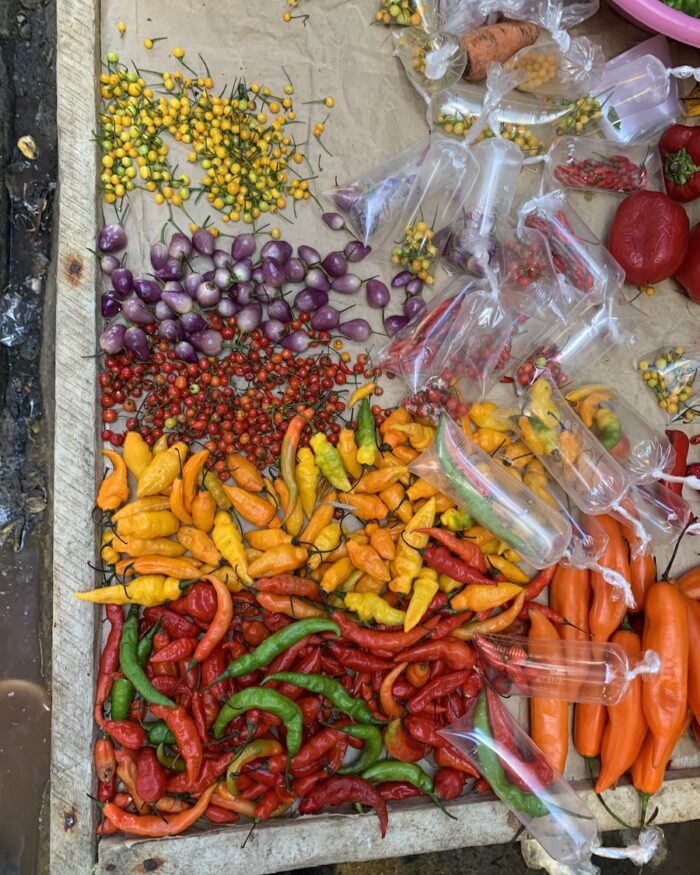
Chili in numerous versions

Meat from wild jungle pigs
Through the market you reach the Belen river – a tributary of the Amazon river. It’s home for a whole little village with people living on stetted houses. They have electricity, fresh water and even a school and a swimming disco. During a boat drive through the river we saw countless children laughing, jumping into the water and swimming next to our boat. The people living here may don’t have much (at least from our point of view) but they live a happy life!

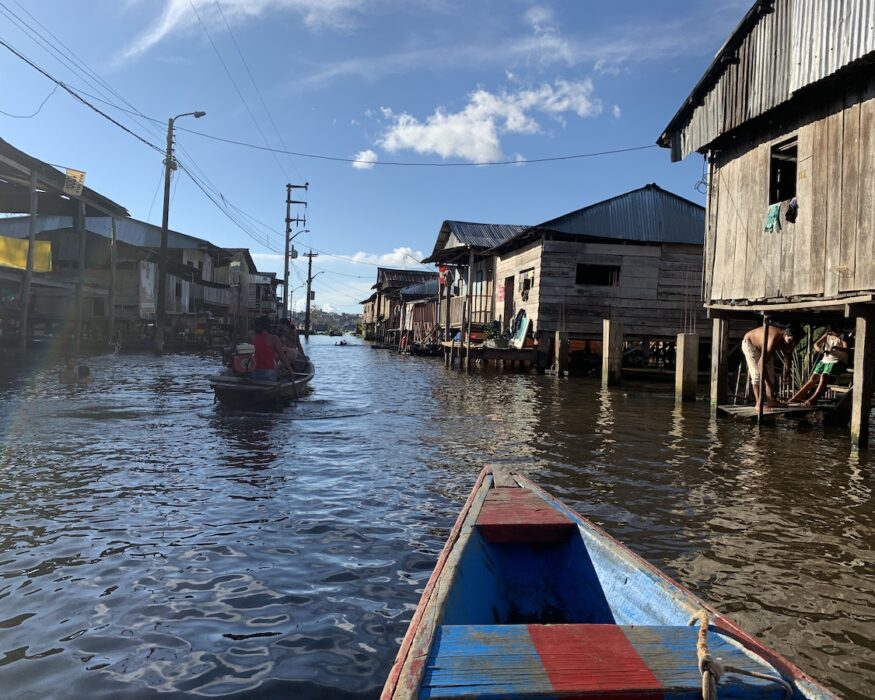
The most common reason to come to Iquitos is to do an Amazon jungle tour. You can stay one day up to one week in the bushes – depending on how much time you have and how deep you wanna go to the jungle.
Since we did this trip to Iquitos quite last minute we had only time for one day – our tour started in the morning and ended with the setting sun.
After picking us up from the hotel by car we were driving to a smaller city called Nauta which lies directly at a river which leads into the Amazon river from where we started the tour by boat.
The river was extremely wide with a strong current and all around us we were surrounded by the jungle. Since the rainy season is only ending in May, the river overflows its banks and spreads water into the jungle. So the trees are literally growing out of the water or mud, that’s why we couldn’t leave our boat but therefore could boat in between the trees.

After spotting countless colorful birds the first mammals we saw were some lazy sloths which were hanging in the tree tops to sleep.
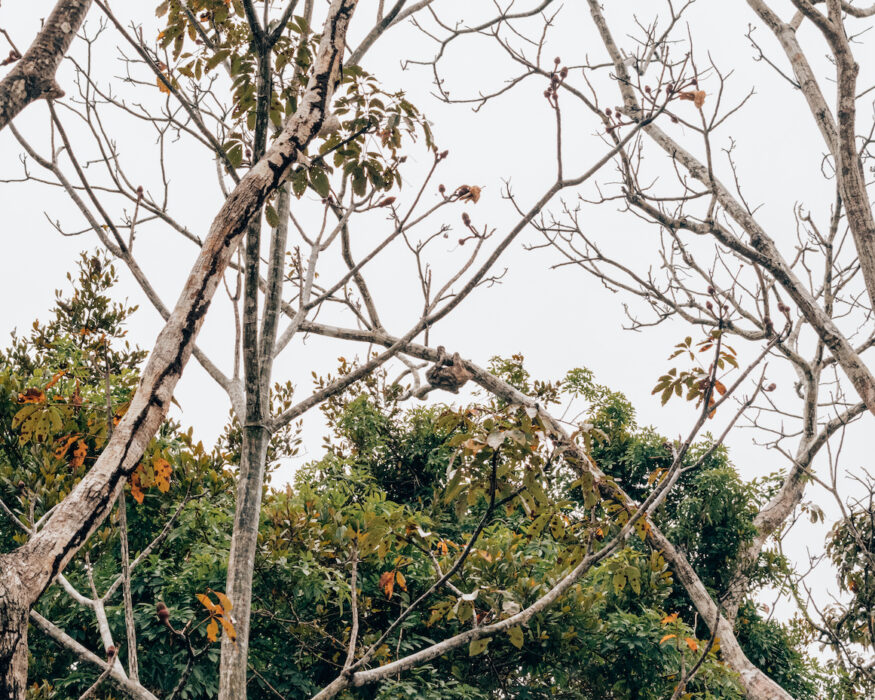
Can you spot the sloth?
Probably the most special species living here are the pink dolphins which we saw quite often during our tour. They look quite different than the grey dolphins living in the ocean.
We even spot a group of some small grey dolphins swimming next to our boat – our guide told us that these grey dolphins come originally from the ocean and swam in the river to catch food.
We spotted many Monkeys playing in the trees above us and some of them even jumped on our boat to look for some food.

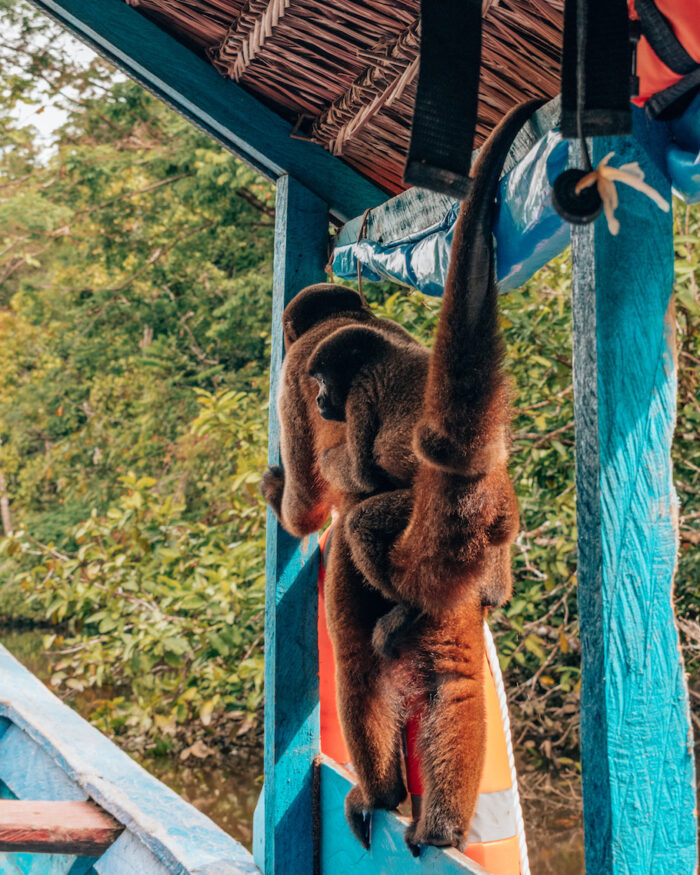
In the afternoon we were trying to catch some piranhas but they mostly just stole our lure and we only got lucky to catch two of them. Our boat driver took them home for dinner!


Our tour to the Amazon jungle has been an unforgettable experience and I wished we could have stayed one more day – we were so close to nature and only surrounded by plants, water and animals we usually only see on pictures.

A coati is watching our passing boat hoping for some bananas

Locals bringing bananas to the village they picked in the jungle.
THE BEGINNING OF OUR ROAD TRIP – THE WEST COAST
From Lima we started our road trip on the Panamerica Sur down the coast to Paracas. The landscape is mostly dry and sparse – due to the dry and windy climate there is barely any plant growing. But the view over the ocean with some giant waves is incredible.

PARACAS
The Paracas National park is the most famous place to visit in the area which can be visited for 11 Soles (3 Euros) per person. You can drive with your own car or take a bus to explore it. There are several beaches, deserts, picturesque cliffs and thousands of sea birds, pelicans and even flamingos to see.
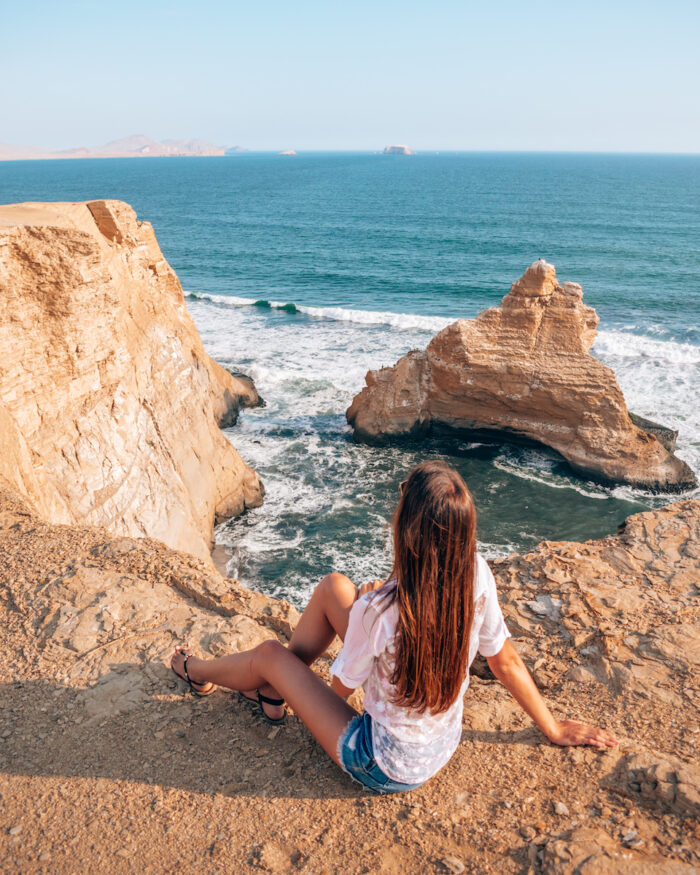

Flamingos in a salt sea
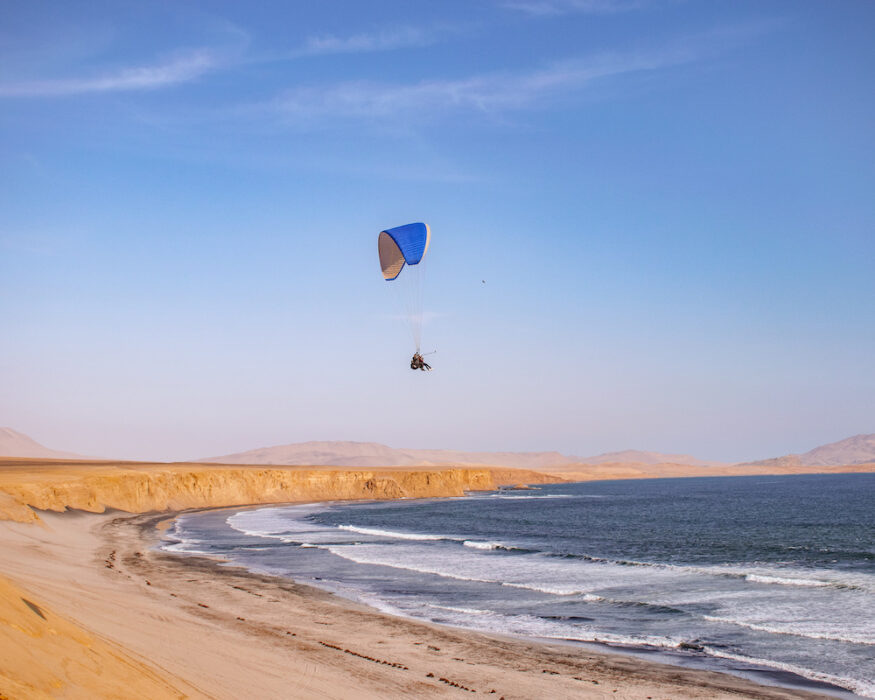

Another Must Do is a boat tour to the Islas Ballestas. From the Paracas Harbour the boats are starting several times daily. After around 30 mins by boat we were reaching the small islands. On the way you see the unique view on a drawing on the rocks which is similar to the Nazca lines. It is so huge that it only can be seen from the ocean and it’s still a secret why it’s there and who made it…

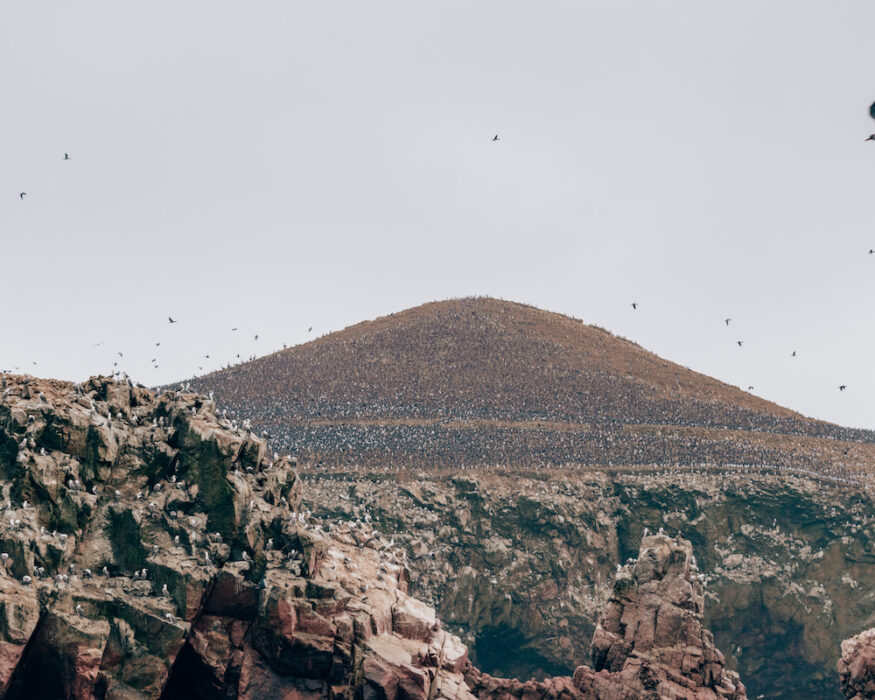
Arriving the Islas you will instantly notice the strong smell of Guano: it is the thick layer of bird poop on the rocks! Every four years they remove it from the islands to use it as a natural fertilizer for farming. When they removed the layer for the first time it has been 30 meters thick.
But of course the reason to visit the Islas Ballestas is not the Guano – it’s the millions of sea birds living here. They are sitting everywhere on the rocks and flying over our heads. Sea gulls, pelicans and even Galapagos penguins can be seen. Also sea lions living here – they are sleeping on the rocks to rest during the day. Some rocks are covered with so many thousands of birds that you can not see a single empty spot!
The whole tour takes around 1 hr 45 mins and can be booked almost everywhere. Since we booked it directly in our hotel we payed 30 USD per person including a private transfer to the harbor and the guided tour. But if you book it directly at the harbor you will pay way less.
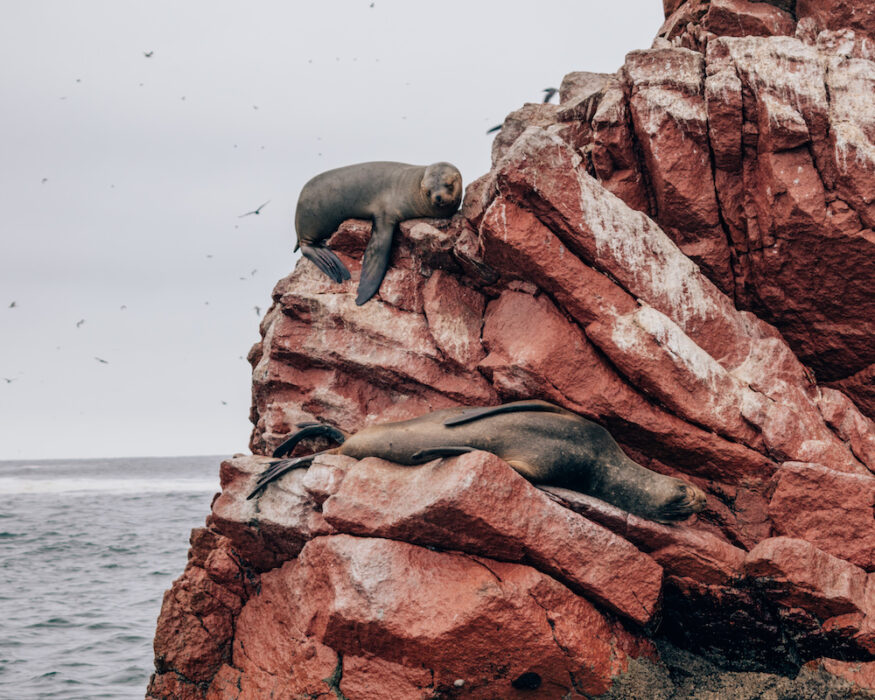

THE VINERIES CLOSE TO ICA

Peru is famous for really good wine! From Paracas we drove to our next stop which is the wine region of Peru close to Ica. There are several vineries which can be visited but the most beautiful one is the Tacama vinery. It’s also the oldest vinery of South America and during our visit we felt like somewhere in the Toscana. There are different Tasting-Tours and the simple one only costs 15 Soles (4 Euro) including three different wines and Pisco. I can highly recommend a visit in the afternoon (the last tour starts 4 pm) cause you can enjoy a lovely dinner after your tour and see the most beautiful sunset over the vineyards – of course while enjoying one or tow nice glasses of wine



A REAL OASIS IN THE DESERT – HUACACHINA
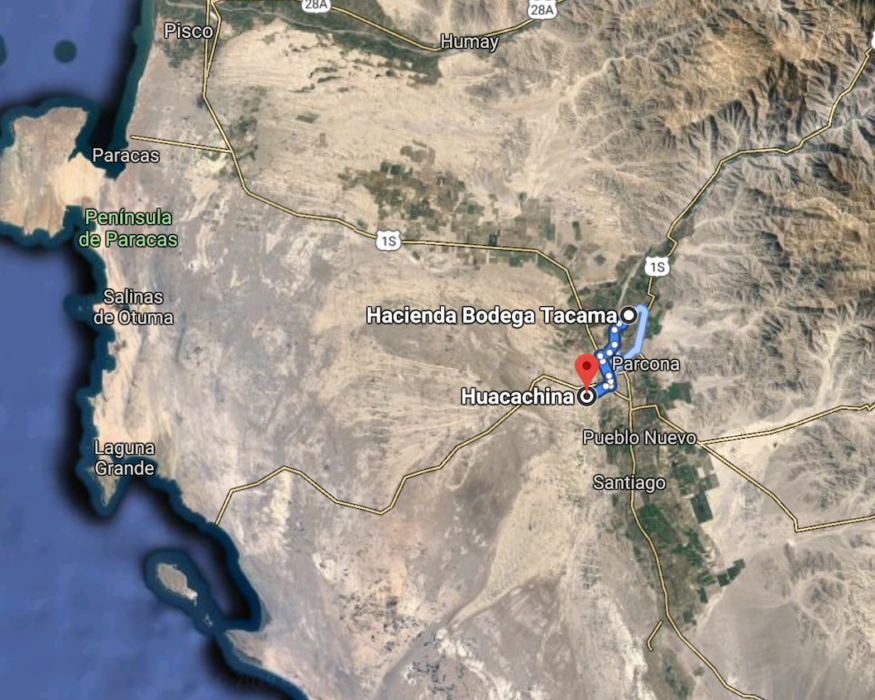
After visiting the vineyards we drove only 30 mins to Huacachina. It’s a special little city located in a natural oasis with only 100 inhabitants but way more tourists. Over the last years there have been many restaurants, camps and simple hotels settling down around the lake in the center.
The most famous activity in Huacachina is a desert tour. We booked a private Sand Boarding tour with Peruvian Sand Adventures. With our sand buggy we drove over the dunes deeper into the desert until we reached our first stop – a small dune for practicing our sand board skills. Right after we continued to some bigger dunes and it first has been a bit terrifying but in the end so much fun to slide down the sand. My highlight was the sunset in the desert – the sky was literally on fire !
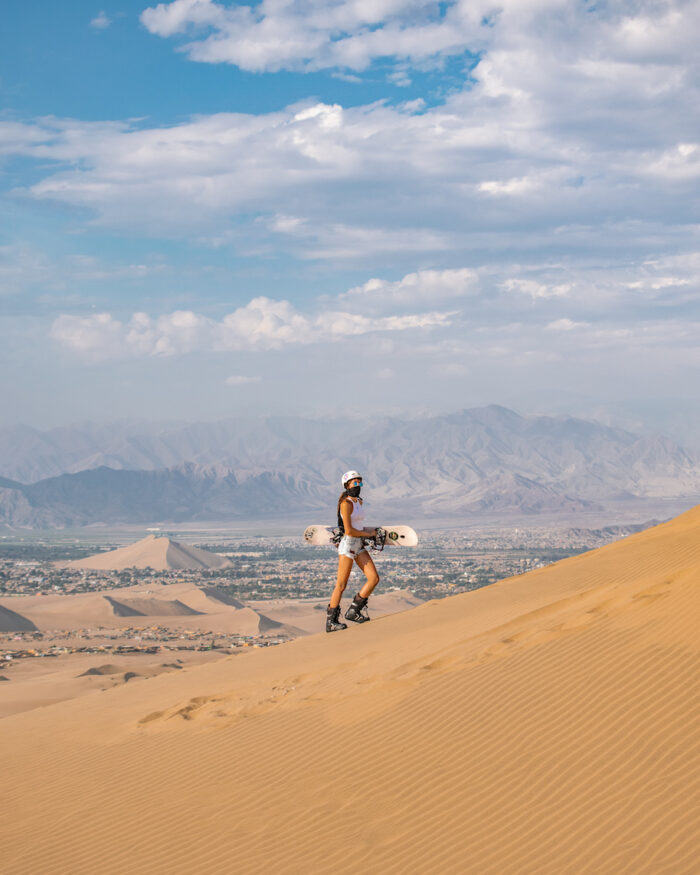

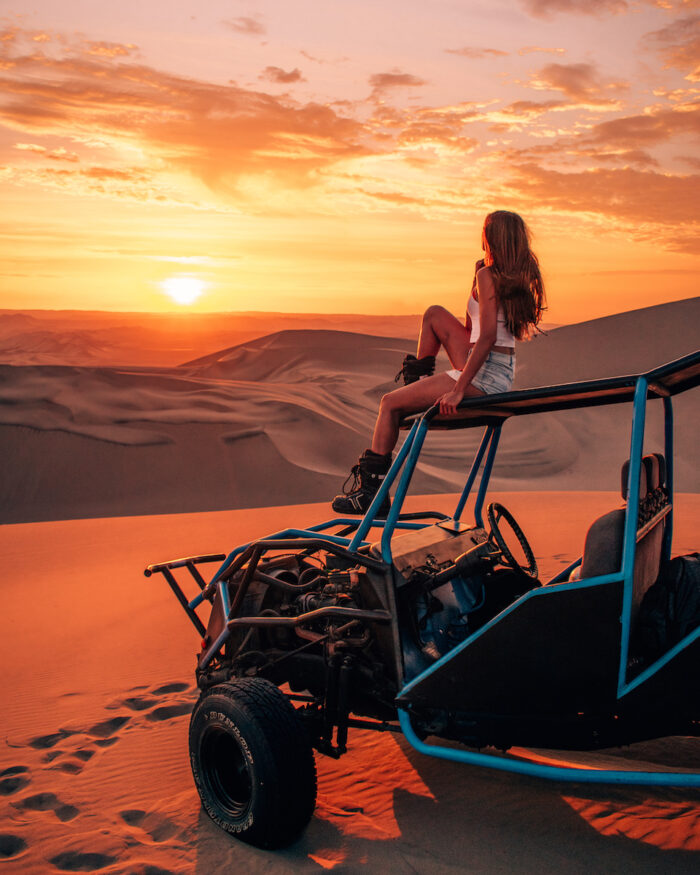
The next morning we walked up the steep dunes around the oasis to overlook Huacachina. It’s unbelievably exhausting to walk up the sand but in the end we made it somehow 
The view over the oasis and the desert is really unique and like nothing I’ve ever seen before – definitely worth the effort of the walk up

THE MYSTERIOUS NAZCA LINES

Next stop on our road trip is Arequipa which is also called the „white city“. The drive from Huacachina takes around 10 hrs but on the way you directly pass the famous Nazca lines. Due to our limited time we didn’t take a flight to see all of them from above. But directly at the street is a tower located from which you can overlook three of the famous lines. What looks unspectacular from the ground looks like real art from this higher point of view: A salamander, a tree and the hands can be seen. Even after 1000 years in the ground the lines are still in great conditions and some of them are several 100 m long!

This is the smallest of all lines – the hands.

The tree
We continue our tour to Arequipa and just in time for sunset we spot a beautiful bay from the street and we simply have to stop to watch the giant waves rolling in with the red sky behind.
Thats the beautiful thing about Peru – die scenery is breathtaking and changes every few kilometers you’re driving.
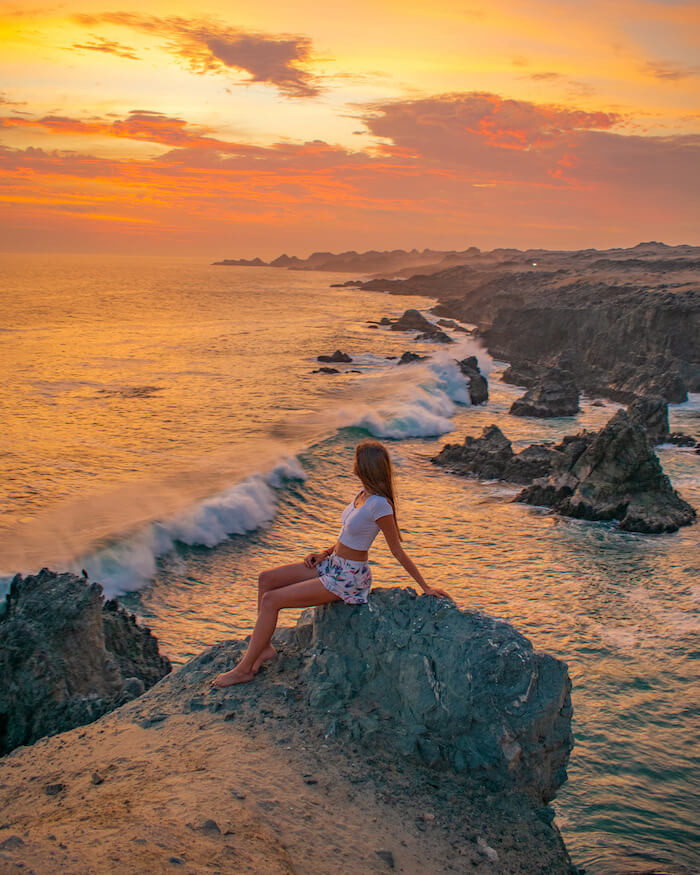
THE WHITE CITY – AREQUIPA
We arrived to our hotel Katari at Plaza de Armas late in the evening and got straight to bed. The more surprised we were the next day when we looked out of our window to see the beautiful main square in front of us. Like in all colonial cities in Latin America the Plaza de Armas is a beautiful park in the historic center of the city with a cathedral behind it.
From our breakfast terrace we had a lovely view over the „white city“ with the volcanoes behind it.
Most of the buildings in the old town are made out of the white volcano rocks Sillar which gave Arequipa the nick name. For me it has been the prettiest city we’ve seen in Peru and the main square of Arequipa is even known as one of the most beautiful ones in Latin America!

The cathedral of Arequipa
Only a few minutes away from the Plaza de Armas lies the pretty monastery „Monasterio D Santa Catalina“ which got built in the 16. century.
It reminds me of a village with everything the nuns needed for their lives in the monastery since they were not allowed to leave it ever. The artful chapels, living rooms of the nuns and kitchens, the picturesque little streets and gardens full of flowers make you feel like stepping back in time. The entry fee is 30 Soles (10,50 Euros) but the areal is huge and you can really see a lot.

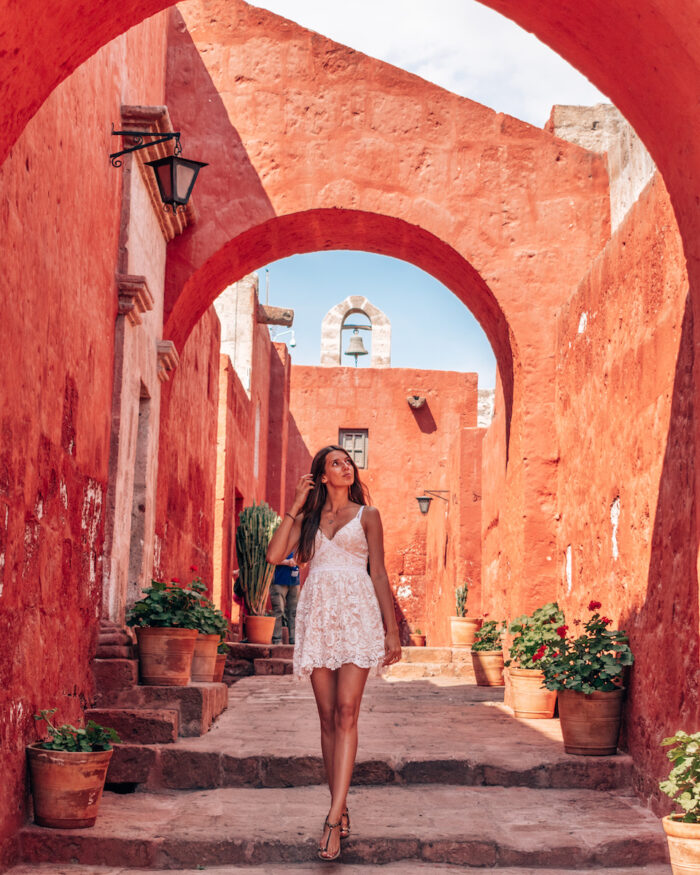
For lunch we made a stop at the cute little restaurant La Despensa with the BEST pizza, fresh paninis and homemade sweets – it’s a little secret spot and als nice for dinner. Make sure to give it a try when you’re in Arequipa!

After walking a bit through the old town in the afternoon we go back to the Katari Hotel at Plaza de Armas to enjoy the view from the terrace with a drink while waiting for sunset – the terrace is also open for people which don’t stay at the Katari. The sunset in Peru in May is quite early and starting around 5.30 pm.
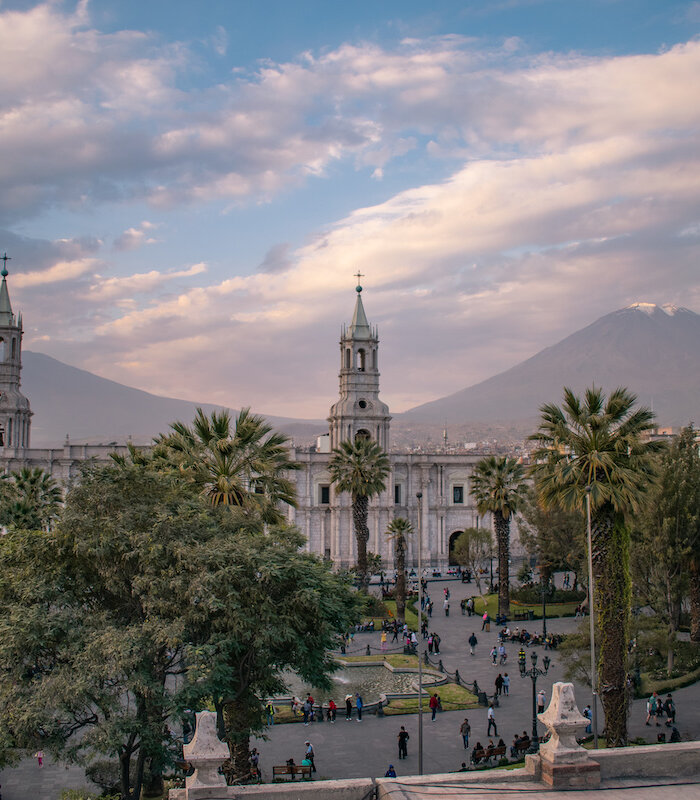

The volcanos behind the cathedral are a dramatic contrast
As the sun was setting completely we visited the cathedral at the main square from the 16. century which was only opening 5-7pm on this day. It was destroyed several times cause of natural catastrophes but always got rebuilt with many impressive details!
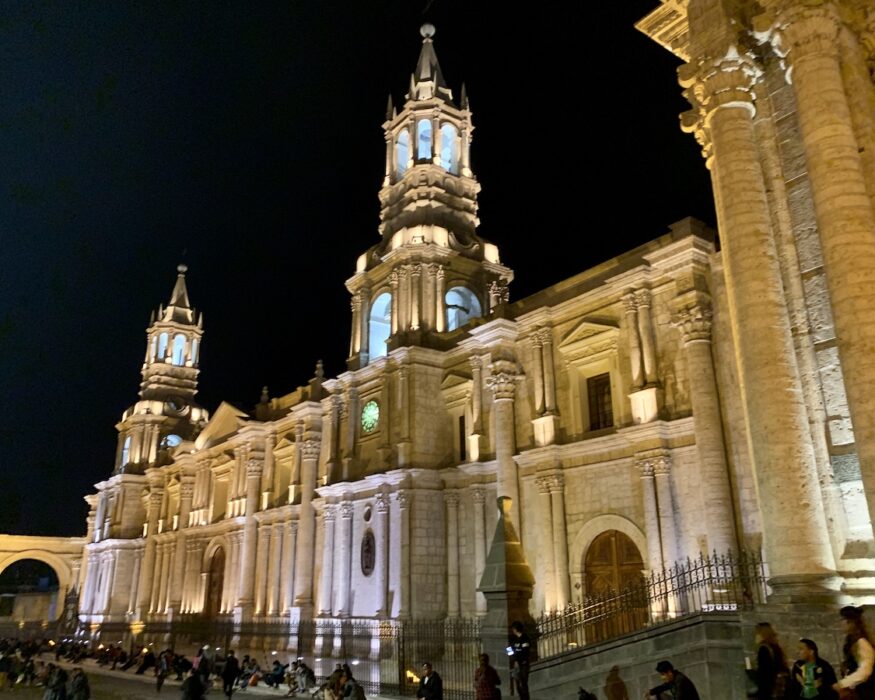
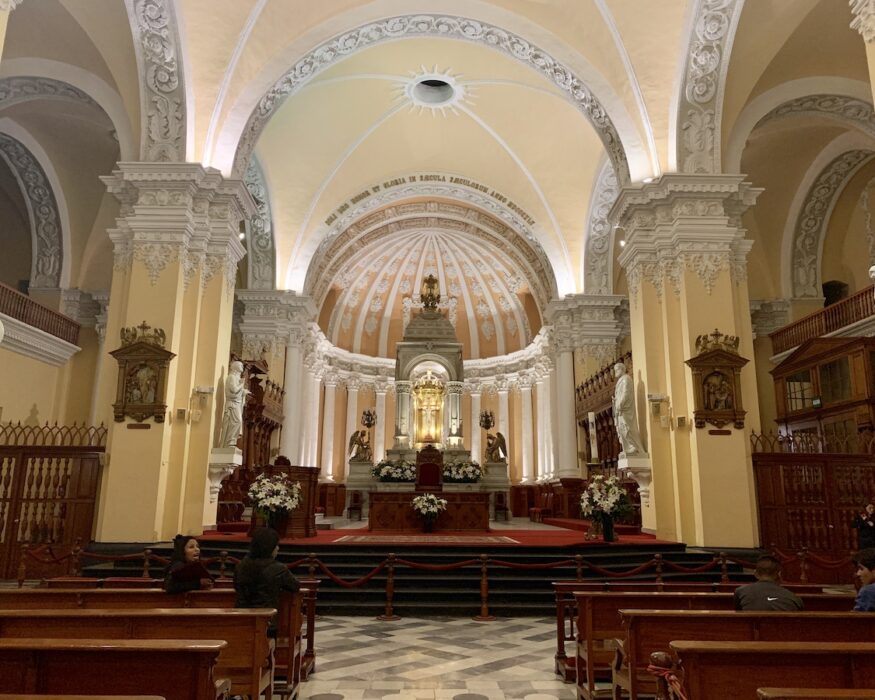
Read here about Part 2 of my Peru Guide: From the Titicaca lake through the Andes to Cusco and Machu Picchu!







Bilal and Izzy
Great article and a wonderful breakdown! Really loved your photos. We’ve been thinking about trip to Peru and this just helped us give us such a better idea of how to plan and what to expect! Thanks for sharing.
voyagefox
Thank you so much 🙂 Peru is really amazing! You would really love it
Summer
Great post! I’m going to Peru this fall to do the Inca Trail to Machu Picchu and very excited. I really want to try sandboarding but don’t think I’ll have time. Very cool that you got to visit the jungle too. I hope maybe I will be able to do a little trip to Rainbow Mountain in Cusco as well, but have heard it’s a really difficult trek and not worth it. Look forward to your thoughts in your follow up post.
-Summer
https://travelingsummer.com
voyagefox
Oh wow! Sounds like a great adventure!
To be honest I LOVED the rainbow mountian – absolutely worth it (if you have nice weather) It’s just quite busy so you should go with a tour which starts very early to be one of the first ones. We had a 2.30 am pick up from Cusco and when we arrived in the mountains for sunrise we had it all to ourselves 🙂
Julie
How many days was your trip from arrival to departure from Peru?
voyagefox
We’ve been 17 full days in Peru 🙂